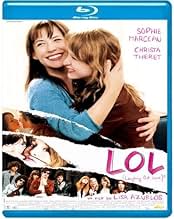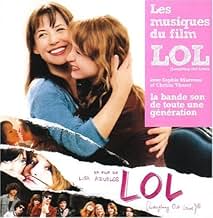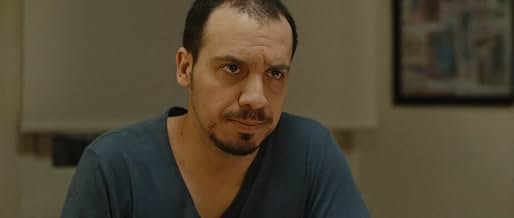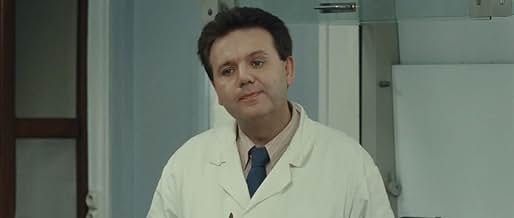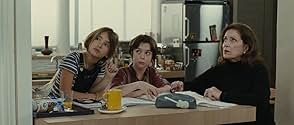AVALIAÇÃO DA IMDb
6,2/10
9,9 mil
SUA AVALIAÇÃO
Adicionar um enredo no seu idiomaWhen Lola's boyfriend is unfaithful to her on his summer holiday, she dumps him and flirts with his best friend as punishment. But as their class prepares to leave on an excursion to London,... Ler tudoWhen Lola's boyfriend is unfaithful to her on his summer holiday, she dumps him and flirts with his best friend as punishment. But as their class prepares to leave on an excursion to London, the relationship heats up.When Lola's boyfriend is unfaithful to her on his summer holiday, she dumps him and flirts with his best friend as punishment. But as their class prepares to leave on an excursion to London, the relationship heats up.
- Prêmios
- 2 vitórias e 1 indicação no total
- Direção
- Roteiristas
- Elenco e equipe completos
- Produção, bilheteria e muito mais no IMDbPro
Enredo
Você sabia?
- CuriosidadesLisa Azuelos both wrote and directed this film after realizing that movies based on teen life in her home country of France were almost entirely missing. She would often see her daughter go to the theatre to watch either an American teen movie or a horror film.
- Erros de gravaçãoIn the beginning of the film, Lola says her nickname is Lol and that everyone calls her that, but throughout the course of the film, nobody calls her Lol --- only Lola.
- ConexõesReferences Starsky e Hutch - Justiça em Dobro (1975)
- Trilhas sonorasSomewhere Only We Know
Performed by Keane
Avaliação em destaque
Every country boasts some films which are so legendary, that a whole generation has identified with their characters. In France, there is - among others - "La grande vadrouille" for the 60's, "La Boum" for the 80's and "LOL" for the 2000's. What "La Boum" did for the teenagers of the 80's, "LOL" did for their children. And, from the movie only, one can guess who had the most innocent childhood.
Like its predecessor, "LOL" has a plot clearly exaggerated for commercial purposes. The heroine, Lola (Christa Theret) - allegedly called "LOL" by her friends, although that doesn't happen in the film - is a teenager living with her single mother and her two siblings. Returning from the summer holidays, she learns that her boyfriend cheated on her, as she did on him. After that moment, her whole life revolves around her relationship, which is heading to an end, her having already found another boyfriend, the sweet Maël (Jérémy Kapone).
All this doesn't sound good to her mother (Sophie Marceau) who is worried about her daughter's dubious friends, more interested in experimenting with drugs and cybersex than performing well at school. To top it all, Lola's father serves more as a means of Lola getting what she wants, than a real family figure. The situation culminates after a trip to London, when Lola clashes with her mother, like never before.
The director, Lisa Azuelos, decided to make this film after noticing the lack of films about teenagers' lives in France. It is true that few teen movies have been made in that country. France didn't have its John Hughes, with maybe only Claude Pinoteau offering a relatively realistic portrayal of teenage psychology with "La Boum".
Unfortunately, the result of Azuelos's effort was mediocre at best, overrated at worst. As previously noted, the plot of the film is too exaggerated to be realistic, involving a class trip to London, drugs, and a love story between a woman and a drug-taking narcotics police officer (!). All this is shown as fun, but aren't exactly served well by the characters.
In its time, "La Boum" had made thousands of teenagers identify with its characters, full of charm and teenage enthusiasm. Belonging to a wholly different era, the heroes of "LOL" behave in other ways; they are more adult-like. For them, the risky thing is to take drugs, or to have sex with their companion, not to ride a motorcycle without helmet. They communicate with cellphones rather than telephones, and listen to music on MP3's rather than Walkmans. Another type of music has marked their generation; no slows here, "Little sister", "Somewhere only we know", are the hits of this age. The now more developed Internet has exposed them to more mature subjects than those their parents knew about in their age. But aren't they also teenagers? Yes, but those of an age marked by the rapid evolution of the Internet, and its consequences. They pretend to be mature, but at heart, they are no different from Vic and her friends, of "La Boum" fame.
It was this, shall I say, surface-level maturity, just being there to hide the characters' sentimental, even childish nature, that made the film unbearable. While "La Boum" was certainly no masterpiece, it presented teenagers' behaviour in a frank way, a mix between childishness and relevant maturity.
If we take "La Boum's" and "LOL's" protagonists, they have many things in common, being both quite selfish, yet loving young girls. Their families are facing trouble from within, and they both resort to their friends and boyfriends in order to find an outlet for their worries and anger. Psychologically, Vic and Lola are the same, but their commonalities end there. Their environment, their age where they grew up, is so distant from one another, that the only way they could interact is by clashing. That's why Lola clashes with her mother - ironically, or rather coincidentally, being interpreted by the actress who once had played Vic . Lola can't understand that her mother was also a teenager. The other can't see her daughter's problems for what they are. Gone are the boums, now teens are worried about serious problems.
And it was this disappointment of seeing the once young, zealous Vic clash with her daughter, with whom they have so much to share, the letdown that it was to see some teenagers hiding their real innocence for a fake, almost nonexistent one, that made me partly dislike this movie. It was a film that showed how Azuelos thought teenagers to be, but in its youthful energy lost its charm and became more of a portrait of a generation that seemed dishonest, although it was as accurate as it could be.
Yes, I know, this is confusing, even antithetic, but I still remain ambivalent over this film. For, its end has some scenes making me feel great joy, it partly stemming from the fact that all the relationship problems, all the family issues were resolved as if by magic.
Like in "La Boum".
Like its predecessor, "LOL" has a plot clearly exaggerated for commercial purposes. The heroine, Lola (Christa Theret) - allegedly called "LOL" by her friends, although that doesn't happen in the film - is a teenager living with her single mother and her two siblings. Returning from the summer holidays, she learns that her boyfriend cheated on her, as she did on him. After that moment, her whole life revolves around her relationship, which is heading to an end, her having already found another boyfriend, the sweet Maël (Jérémy Kapone).
All this doesn't sound good to her mother (Sophie Marceau) who is worried about her daughter's dubious friends, more interested in experimenting with drugs and cybersex than performing well at school. To top it all, Lola's father serves more as a means of Lola getting what she wants, than a real family figure. The situation culminates after a trip to London, when Lola clashes with her mother, like never before.
The director, Lisa Azuelos, decided to make this film after noticing the lack of films about teenagers' lives in France. It is true that few teen movies have been made in that country. France didn't have its John Hughes, with maybe only Claude Pinoteau offering a relatively realistic portrayal of teenage psychology with "La Boum".
Unfortunately, the result of Azuelos's effort was mediocre at best, overrated at worst. As previously noted, the plot of the film is too exaggerated to be realistic, involving a class trip to London, drugs, and a love story between a woman and a drug-taking narcotics police officer (!). All this is shown as fun, but aren't exactly served well by the characters.
In its time, "La Boum" had made thousands of teenagers identify with its characters, full of charm and teenage enthusiasm. Belonging to a wholly different era, the heroes of "LOL" behave in other ways; they are more adult-like. For them, the risky thing is to take drugs, or to have sex with their companion, not to ride a motorcycle without helmet. They communicate with cellphones rather than telephones, and listen to music on MP3's rather than Walkmans. Another type of music has marked their generation; no slows here, "Little sister", "Somewhere only we know", are the hits of this age. The now more developed Internet has exposed them to more mature subjects than those their parents knew about in their age. But aren't they also teenagers? Yes, but those of an age marked by the rapid evolution of the Internet, and its consequences. They pretend to be mature, but at heart, they are no different from Vic and her friends, of "La Boum" fame.
It was this, shall I say, surface-level maturity, just being there to hide the characters' sentimental, even childish nature, that made the film unbearable. While "La Boum" was certainly no masterpiece, it presented teenagers' behaviour in a frank way, a mix between childishness and relevant maturity.
If we take "La Boum's" and "LOL's" protagonists, they have many things in common, being both quite selfish, yet loving young girls. Their families are facing trouble from within, and they both resort to their friends and boyfriends in order to find an outlet for their worries and anger. Psychologically, Vic and Lola are the same, but their commonalities end there. Their environment, their age where they grew up, is so distant from one another, that the only way they could interact is by clashing. That's why Lola clashes with her mother - ironically, or rather coincidentally, being interpreted by the actress who once had played Vic . Lola can't understand that her mother was also a teenager. The other can't see her daughter's problems for what they are. Gone are the boums, now teens are worried about serious problems.
And it was this disappointment of seeing the once young, zealous Vic clash with her daughter, with whom they have so much to share, the letdown that it was to see some teenagers hiding their real innocence for a fake, almost nonexistent one, that made me partly dislike this movie. It was a film that showed how Azuelos thought teenagers to be, but in its youthful energy lost its charm and became more of a portrait of a generation that seemed dishonest, although it was as accurate as it could be.
Yes, I know, this is confusing, even antithetic, but I still remain ambivalent over this film. For, its end has some scenes making me feel great joy, it partly stemming from the fact that all the relationship problems, all the family issues were resolved as if by magic.
Like in "La Boum".
- eightylicious
- 28 de mar. de 2022
- Link permanente
Principais escolhas
Faça login para avaliar e ver a lista de recomendações personalizadas
- How long is LOL (Laughing Out Loud)?Fornecido pela Alexa
Detalhes
- Data de lançamento
- País de origem
- Central de atendimento oficial
- Idiomas
- Também conhecido como
- LOL (Laughing Out Loud)
- Locações de filme
- Empresas de produção
- Consulte mais créditos da empresa na IMDbPro
Bilheteria
- Faturamento bruto mundial
- US$ 32.764.784
- Tempo de duração1 hora 43 minutos
- Cor
- Mixagem de som
- Proporção
- 2.35 : 1
Contribua para esta página
Sugerir uma alteração ou adicionar conteúdo ausente



